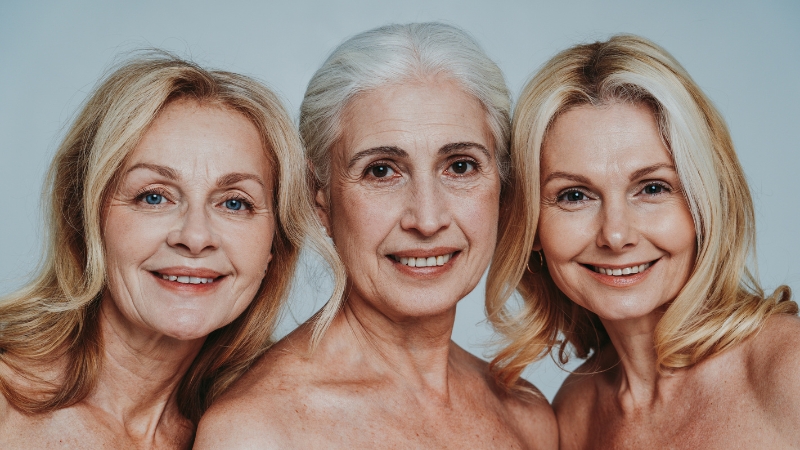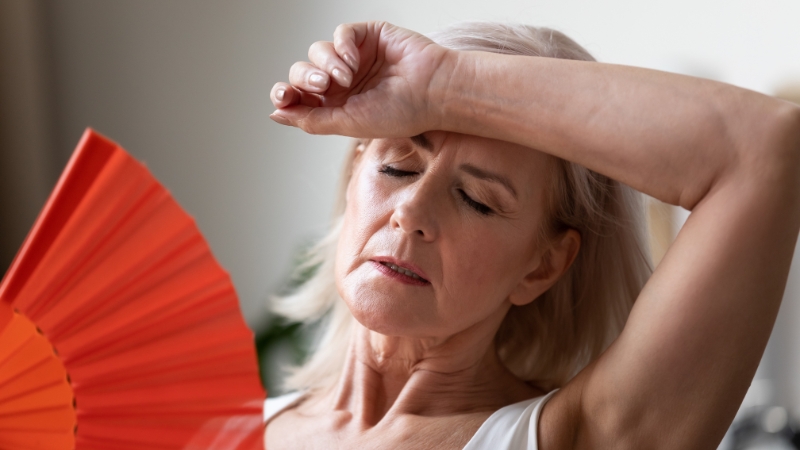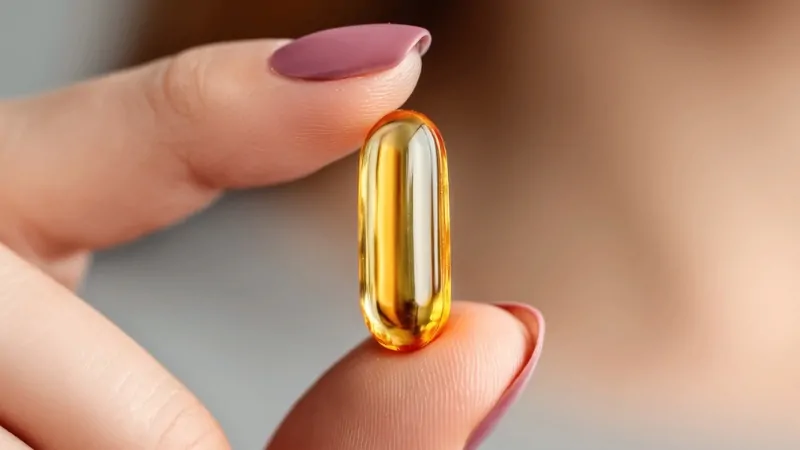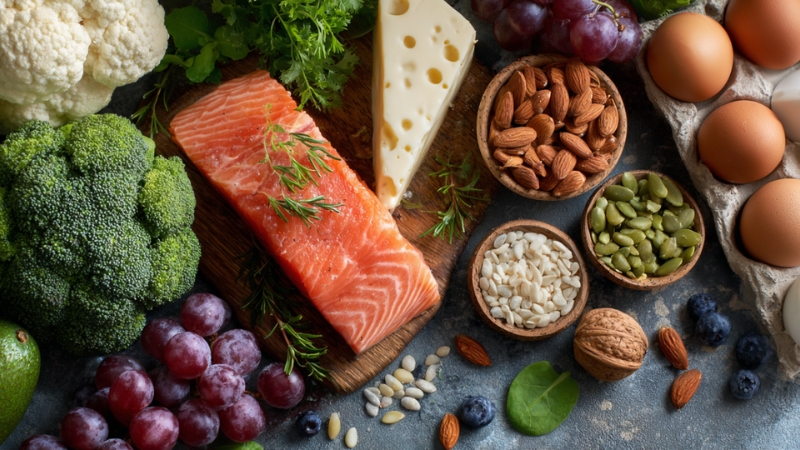
Share Post:
Menopause marks the end of a woman’s reproductive years, typically occurring between the ages of 45 and 55.
Perimenopause refers to the transitional period leading up to menopause, during which hormone levels begin to fluctuate.
Common symptoms often include hot flushes, night sweats, mood swings, vaginal dryness, fatigue, and disrupted sleep.
Concerns about potential risks linked to hormone replacement therapy have led to growing interest in natural and non-hormonal approaches.
Lifestyle and Behavioral Modifications

Addressing symptoms through diet, physical activity, and environmental awareness can lead to lasting improvements in well-being without medical intervention.
Dietary Adjustments
A Mediterranean-style diet, focused on whole foods and nutrient-dense ingredients, provides essential support during menopause.
Emphasizing healthy fats, fruits, vegetables, legumes, whole grains, and lean proteins helps balance energy and stabilize hormone levels.
Key foods to include:
- Calcium and Vitamin D sources: dairy, leafy greens, sardines, and fortified plant milks help maintain bone density and prevent osteoporosis.
- Phytoestrogens: soybeans, tofu, flaxseed, and red clover contain compounds that may mimic estrogen and support hormonal balance.
Limiting or avoiding the following can ease discomfort:
- Alcohol and caffeine: may trigger hot flushes and worsen sleep quality.
- Spicy foods and processed sugars: contribute to inflammation and blood sugar fluctuations that affect mood and energy.
Meal timing and portion control also matter. Eating smaller, balanced meals throughout the day supports metabolism and reduces hot flush frequency.
Exercise and Physical Activity
@lucywyndhamread Moves that help reduce Menopausal Symptoms 💕great for joint health, bone health, heart health and metabolic health. You can find the full FREE workout on my YouTube Channel at Lucy Wyndham-Read #menopause #perimenopause #menopausesymptoms #menopausesupport #menopausejourney ♬ original sound – Lucy Wyndham-Read – Fitness
Staying active is one of the most effective ways to reduce menopausal symptoms. Regular movement improves mood, regulates weight, strengthens bones, and supports cardiovascular health.
Recommended activities:
- Aerobic exercises, brisk walking, cycling, or swimming improve circulation and reduce anxiety.
- Strength training: preserves muscle mass and bone density, which naturally decline with age.
- Yoga and flexibility workouts: calm the nervous system, ease joint stiffness, and promote restful sleep.
Consistency is key. Even short daily sessions can produce noticeable changes in energy levels and symptom frequency.
Weight Management
Weight gain, particularly around the abdomen, often intensifies during menopause.
Visceral fat has been linked to worsening hot flushes, insulin resistance, and increased inflammation.
Effective strategies include:
- Maintaining a regular exercise routine.
- Prioritizing fiber-rich foods to regulate appetite and support digestion.
- Avoiding crash diets and instead focusing on long-term nutritional habits.
- Getting sufficient sleep, as poor rest contributes to cravings and metabolic imbalance.
Small adjustments in lifestyle often yield better long-term results than aggressive short-term diets.
Environmental Control

Helpful strategies include:
- Dressing in light layers made of breathable fabrics like cotton or bamboo.
- Using moisture-wicking sheets and cooling pillows.
- Keeping a fan by the bed or using air conditioning to maintain a cool environment.
- Avoid heavy blankets and sleeping in a well-ventilated room.
Creating a soothing sleep environment helps the body maintain a more stable internal temperature, which is especially useful during hormonal fluctuations.
Herbal and Natural Supplements
Many turn to herbal and natural supplements as part of a holistic approach to menopause.
While promising, these remedies should be used with caution and under the guidance of a healthcare professional due to possible interactions with medications or pre-existing conditions.
For Hot Flushes and Night Sweats
Several plant-based supplements contain compounds that may influence estrogen receptors, offering relief for vasomotor symptoms.
- Black Cohosh: Often used for hot flushes, with some clinical studies indicating modest effectiveness.
- Red Clover: It contains isoflavones that may mimic estrogen; often recommended after menopause for symptom relief.
- Hops: Traditionally associated with calming effects, this herb also shows potential in reducing hot flush frequency.
- St. John’s Wort + Passionflower: A combination used to alleviate mood changes while also easing hot flushes.
Effectiveness varies from person to person. Regular monitoring helps ensure that results remain beneficial and safe.
For Mood, Sleep & Fatigue
Menopause often disrupts emotional equilibrium and sleep cycles. Certain herbs have calming and restorative properties that help stabilize mood and energy.
- Chamomile, Lemon Balm, Valerian, and Passionflower: Promote relaxation, reduce anxiety, and encourage restful sleep.
- Korean Ginseng: Used traditionally to combat fatigue, improve mental clarity, and possibly enhance libido.
- St. John’s Wort: A well-known herbal antidepressant, potentially helpful for mood swings, though it carries significant interaction risks with SSRIs and hormonal therapies.
Sleep-enhancing herbs should be taken at consistent times, usually in the evening, to help re-establish healthy sleep rhythms.
Cannabis products such as tinctures, edibles, and oils may provide additional support during this phase of life.
For those exploring cannabis-based relief, it’s important to choose a reputable source that offers both variety and quality. To find a wide selection of CBD-rich and hybrid formulations in a trusted dispensary setting, visit EuphoriaWellnessNV.com.
For Vaginal Dryness
Did you know that black cohosh is a botanical that can support women during menopause? http://t.co/2IZc9lYiL3
— Arbonne (@arbonne) October 16, 2015
Vaginal tissue changes can cause discomfort and irritation. Certain natural remedies may offer support.
- Black Cohosh vaginal cream: May improve tissue elasticity and reduce dryness.
- Linseed (flaxseed): Offers lignans and omega-3 fatty acids that may nourish vaginal tissues and improve lubrication.
Topical application often yields faster results than oral supplementation in this case.
For Low Libido
Decreased interest in intimacy can stem from hormonal shifts, fatigue, or emotional stress. A few herbs may offer mild benefits, though evidence remains limited.
- Tribulus Terrestris: Some studies suggest potential support for libido and arousal, particularly in postmenopausal women.
- Maca Root: Often promoted for stamina and sexual desire, with anecdotal and emerging scientific support.
- Korean Ginseng: Included again here due to its possible effects on libido, circulation, and energy.
Individual results may vary significantly. Supplement use should always be coupled with broader lifestyle approaches for better outcomes.
Mind-Body and Complementary Therapies
Emotional health and physical well-being often become tightly interwoven during menopause.
Mind-body therapies aim to relieve symptoms without medication, supporting emotional regulation, hormonal balance, and sleep quality.
Yoga

Gentle movement combined with controlled breathing has proven benefits during menopause. Yoga helps manage hot flushes, improve mood, and reduce tension.
- Enhances flexibility, posture, and balance.
- Supports bone health through weight-bearing poses.
- Encourages relaxation, helping reduce cortisol levels.
- Builds mental focus, which can ease irritability and mental fog.
Poses such as Viparita Karani (legs-up-the-wall) and Supta Baddha Konasana (reclining bound angle) are especially soothing.
Cognitive Behavioral Therapy (CBT)
CBT addresses negative thought patterns and behaviors. During menopause, it can help individuals process mood swings, body image concerns, and sleep disruptions.
- Helps reframe unhelpful thinking that intensifies anxiety or depression.
- Provides structured coping strategies for insomnia.
Offers techniques for managing stress-induced symptoms, such as racing thoughts or heart palpitations.
CBT is available through therapists or online platforms and can be tailored to focus specifically on menopausal concerns.
Hypnotherapy
By tapping into the subconscious mind, hypnotherapy aims to calm the nervous system and rewire the brain’s response to triggers such as heat or stress.
- Some report fewer hot flushes and less intense night sweats.
- Promotes deeper relaxation and improved sleep.
- Enhances self-awareness and emotional regulation.
Sessions may be guided by a trained practitioner or accessed via recordings designed for symptom relief.
Final Thoughts
Menopause signals a new phase in a woman’s life, one that brings changes but also opportunities for self-awareness and renewed balance.
While symptoms can feel disruptive, natural solutions provide meaningful ways to adapt without defaulting to hormonal therapy.
Lifestyle changes, mindful eating, movement, and emotional support play critical roles in daily comfort.
Complementary therapies and carefully chosen supplements offer extra relief when used thoughtfully. Over-the-counter aids support intimacy, self-care, and daily confidence.
Related Posts:








